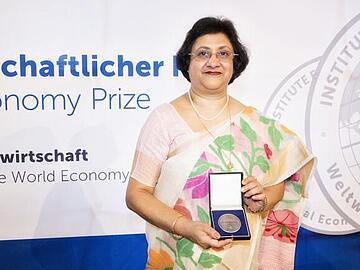Arundhati Bhattacharya

Arundhati Bhattacharya was born on March 18, 1956, in Calcutta, India. She is a member of the country’s Brahmin caste and grew up in Bhilai in central India. The city is home to one of the largest steel works in India, the Bhilai Steel Plant, where her father worked as a manager. After attending a Jesuit school, she wanted to study medicine, but failed to gain admission. She then chose to study English literature instead. After graduating, in 1975 she took—and passed—the entrance examination for the civil service on a whim. In 1977, she joined the State Bank of India (SBI) as a trainee.
She worked in a variety of positions at SBI, being initially responsible for lending to farmers before working in investment banking in New York. In 2005, Bhattacharya took over leadership of the bank’s operations in the state of Uttar Pradesh in northern India. In October 2013, she was appointed by the Indian government to the State Bank board for a three-year term. In the SBI’s 209-year history, she was the first woman to hold this senior position and the first woman to head a Fortune 500 company in India. It was also the first time the position was awarded for a limited period only. At the time, the SBI had 220,000 employees, 15,000 branches, and provided a fifth of all loans made in India.
Bhattacharya described the organization and management at SBI, in which the state holds a majority stake, as "sleepy," with a structure characterized by state socialism and excessive bureaucracy. She considered customer service to be underdeveloped and criticized “cronyism” in business operations in the regions. Bhattacharya has also had to contend with declining profits and non-performing loans.
She has significantly boosted the efficiency of workflows at SBI, partly by deploying new technologies. She established a new subsidiary, SBI in Touch, which has a paperless policy in its branches and relies exclusively on electronic communications and touchscreens. Her declared objective is to attract more young people as customers and to transform SBI from a state bank into a modern service provider for banking transactions.
Based on her own experience of juggling the roles of bank manager, wife, and mother, Bhattacharya instituted a 2-year sabbatical leave policy at SBI that enables women to care for their children and relatives. Fortune voted Bhattacharya the fourth most powerful woman in Asia and Forbes ranked her among the 30 most powerful women in the world. In 2016, her contract was renewed for an unlimited period. She is married and has one daughter.